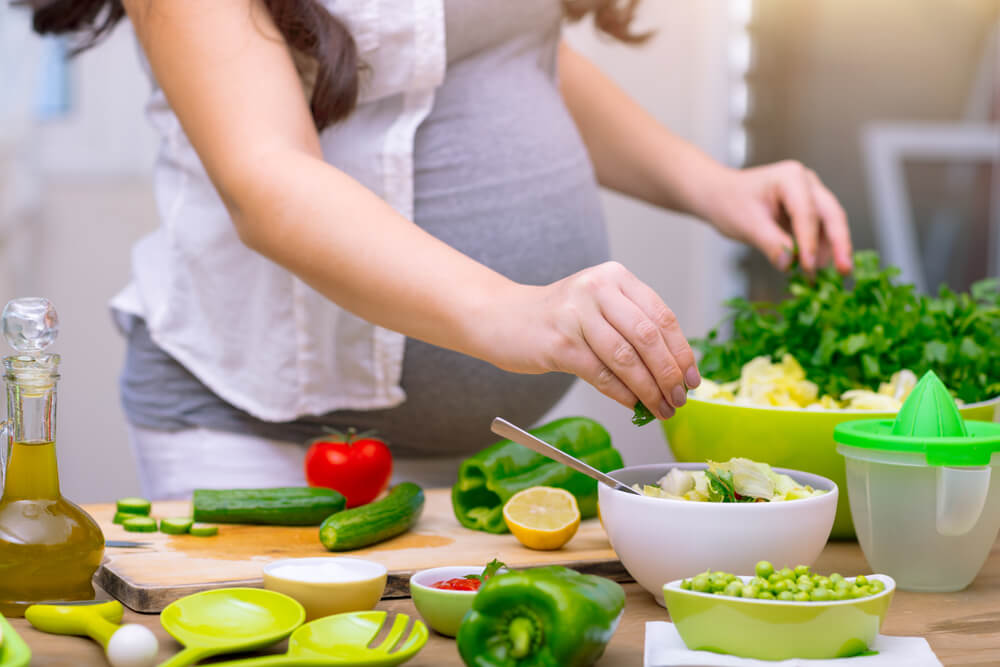
Proper nutrition is crucial during pregnancy, because it not only prepares the woman’s body for childbirth but also promotes the baby’s well-being. A balanced diet provides you with sufficient energy, supports overall health and foetal development.
Helpful Tips for Healthy Eating During Pregnancy:
- Opt for Nutritious Eating, Avoid Overeating
Keep your weight within a healthy range during pregnancy to avoid the risk of developing diabetes and high blood pressure. Focus on nutrient-rich foods that provide essential vitamins, minerals, and macronutrients for a healthy pregnancy. The energy requirement for mothers-to-be is approximately 300-500 kcal per day, compared to the average non-pregnant requirement of around 200 kcal per day. - Manage Eating Routines and Balance Meals
During the first trimester, some women may encounter morning sickness, and as the pregnancy progresses, they may experience heartburn, gastric issues, and bloating. To manage these discomforts, consider consuming smaller portions during main meals and incorporate healthy snacks in between, such as fruit salad and vegetable sticks. This helps prevent rapid stomach distension and maintain a steady supply of nutrients throughout the day. - Consider Essential Nutrients for Pregnancy
A number of essential nutrients contribute significantly to the health and development of mother and baby during pregnancy. These include:- Folic Acid: Also known as folate, this is a B-vitamin that prevents neural tube defects or malformations in the brain and spinal cord of a developing baby. The most common food sources of folic acid include leafy green vegetables (spinach, broccoli), citrus fruits, and fortified cereals.
- Iron: This mineral is essential for producing haemoglobin, a protein found in red blood cells that carries oxygen throughout the body. To ensure an adequate iron intake, incorporate lean red meat, poultry, fish, dark leafy vegetables, beans, lentils, and cereals into your diet.
- Calcium: This helps build the baby’s bones and teeth. Good sources of calcium include dairy products such as milk, yoghurt, and cheese, as well as nuts, tofu, green leafy vegetables, and small fish such as “ikan bilis” and sardines.
- DHA (docosahexaenoic acid): This is a type of omega-3 fatty acid necessary for a baby’s brain and visual development. Salmon, cod, herring, halibut, and omega-3-fortified eggs are some DHA-rich foods.
- Stay Hydrated
Drinking an adequate amount of water is essential during pregnancy, as it helps transport nutrients to the baby and prevents complications such as constipation and urinary tract infections. A pregnant woman should aim to drink at least 8–10 glasses of water per day. - Choose Local Delicacies Wisely
Singapore is known for its diverse cuisine; however, you should make informed decisions when enjoying these local dishes. Opt for grilled, steamed, or stir-fried dishes rather than deep-fried or heavily processed options to ensure you get the necessary nutrients while minimising unhealthy fats and excessive sodium intake. - Avoid Certain Foods
To prevent potential health risks and ensure the safety of the developing baby, pregnant women should avoid certain foods that contain bacterial toxins and harmful chemicals, including:- Unpasteurised dairy products like raw milk and soft cheeses
- Raw or uncooked foods like sashimi and sushi
- Certain types of fish with high levels of mercury, like swordfish
- Alcohol and caffeine
- Herbal supplements
- Consult with Healthcare Professionals
You may seek individualised guidance from an obstetrician and a dietitian. You can consult them for specific dietary requirements and proper nutrition, and to address any concerns or complications that may arise during pregnancy.
The overall health of a mother and baby during pregnancy partially influenced by diet. Having a proper diet will provide you with adequate nutrients, vitamins, and minerals and helps minimise pregnancy-related complications such as low birth weight, gestational diabetes, and developmental issues.





